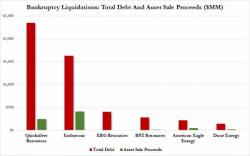The Institutionalized Looting Of America

Submitted by Jesse via Jesse's Cafe Americain blog,
"Give a small number of people the power to enrich themselves beyond everyone's wildest dreams, a philosophical rationale to explain all the damage they're causing, and they will not stop until they've run the world economy off a cliff."
Philipp Meyer
